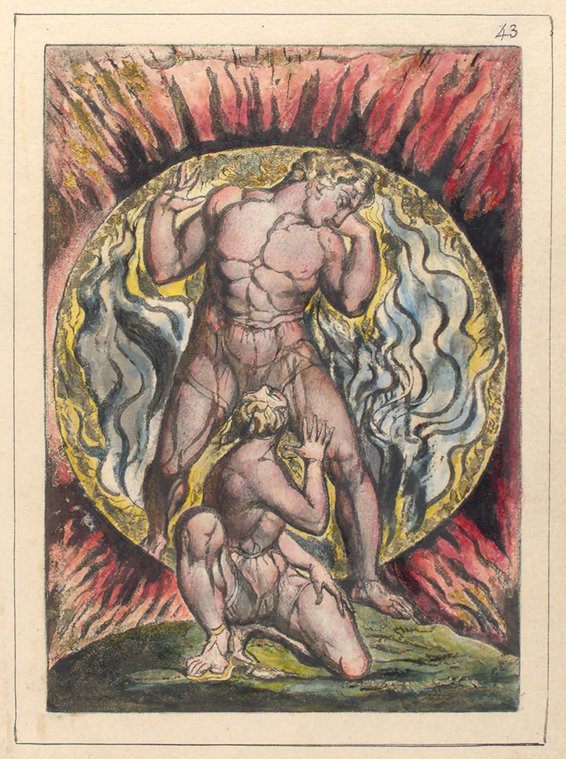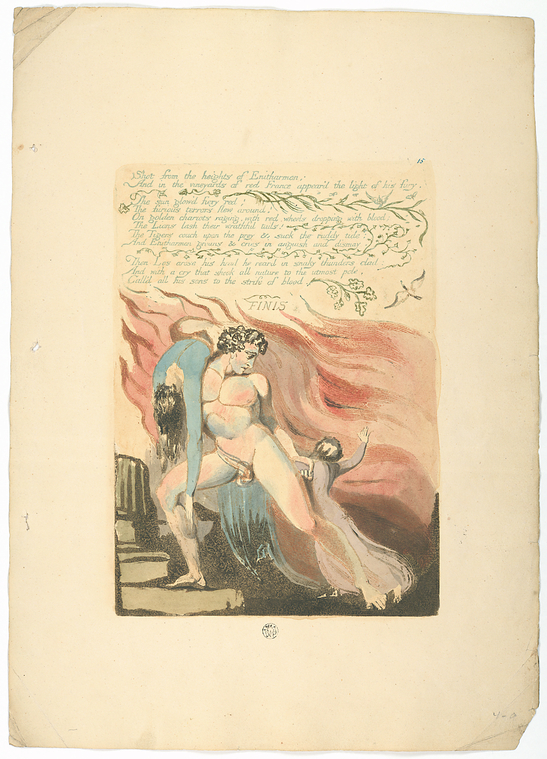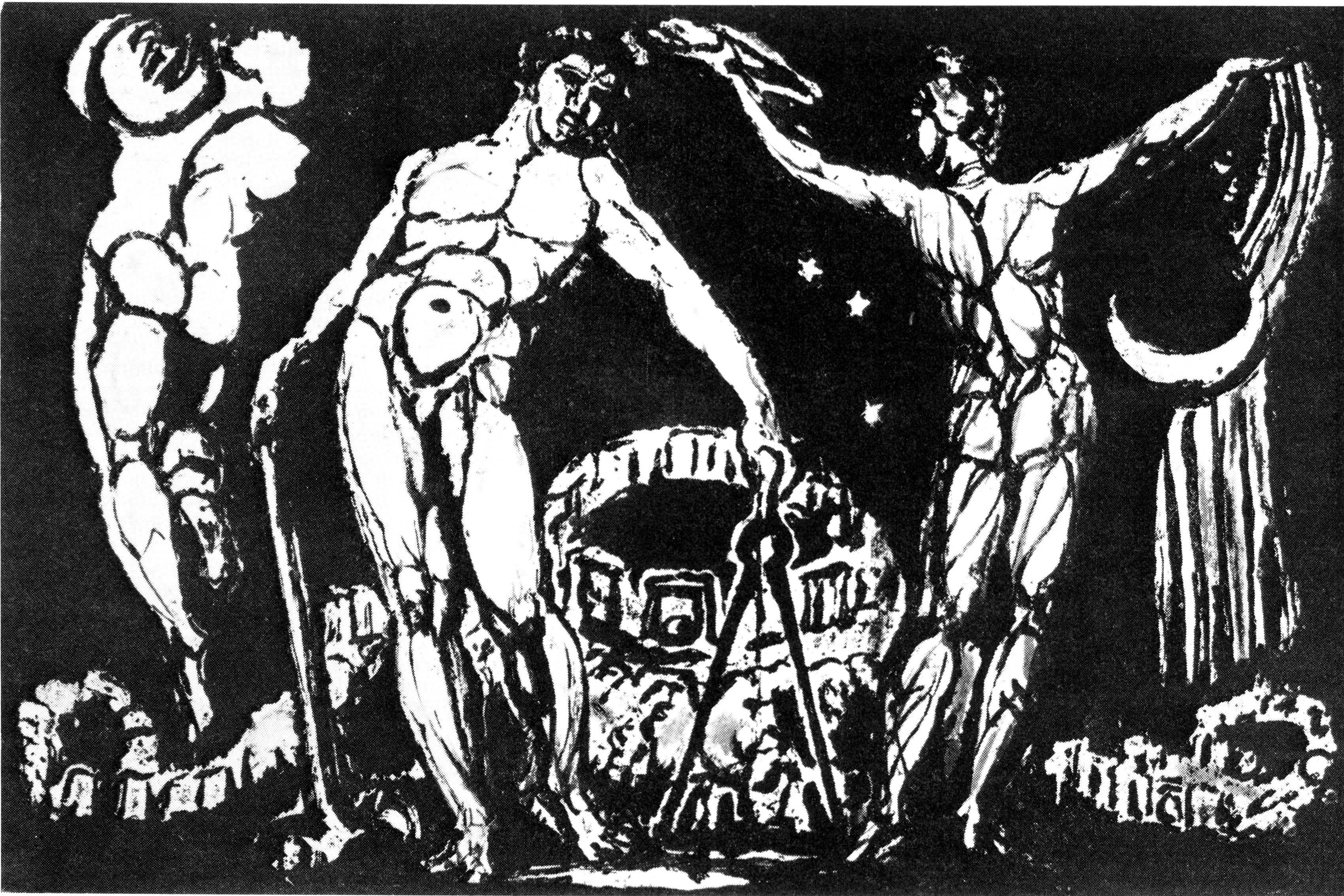First posted Sept 2019
 |
| New York Public Library Milton Plate 43 |
"Los...is the spirit of prophecy which spoke through Elijah and Ezekiel; and if with him the biblical dimension is introduced in its fullness in Blake's poetry, it should be added that it is Milton who presides over this transformation. Milton is the inspired biblical poet of an age of faith who had wedded poetry to the inspiration of the Bible. And so Los becomes the spirit of biblical poetry; with his arrival of Eden and Jerusalem become major symbols. The new phase of Blake's poetry beginning with the later additions of The Four Zoas and reaching its fullness in Milton and Jerusalem is thus in a most particular degree biblical, and the agent of the transformation is Milton. We can watch the actual dynamics of the process, Los, busy creating the world and governing it through time to its predestined conclusion, looks around for a means of redeeming the enchained Orc (that is the stifled spirit of revolution). In Plate 20 of Milton that means is discovered:
Milton, Plate 20, (E 115)
'He recollected an old Prophecy in Eden recorded,
And often sung to the loud harp at the immortal feasts
That Milton of the Land of Albion should up ascend
Forwards from Ulro from the Vale of Felpham; and set free
Orc from his Chain of Jealousy'
Here the epiphany is precisely located and its nature defined. Milton is the prophet of England-Albion, but his arrival is prophesied in Eden, that is it is biblically motivated and directed. The transforming moment occurs, we are told, in the Vale of Felpham, that is between 1800 and 1803, and its outcome will be the freeing of Orc from his Chain, that is to say, the giving of new direction to the perverted spirit of Revolution now disclosed to be the ugliness of the Napoleonic era in France and the parallel manifestation in the England of Pitt and George III.
The fundamental value of Milton's spiritual achievement to Blake then was that he enabled him to relate the temporal, political reality to the biblical."
That reconciliation of his use of imagination in interpreting biblical history with using imagination to understand of the revolutionary events of the Seventeenth and Eighteenth centuries became for Blake the key to entering a new stage of spiritual development. He associated his breakthrough with having assimilated the progress Milton had made in freeing himself from the constraints imposed by his religious and political affiliations. Blake represented his transformation as having occurred through Milton entering his foot. The implication is that Blake's imagination was enlarged not through some grand revelation but through a humble response resulting from living with Milton's physical experiences and mental achievements.
Plate 43 represents the culmination of Blake's incorporating what Milton gave him. Blake is pictured not with his mentor Milton but with Los 'in that fierce glowing fire.'
Letters, To Thomas Butts, Enclosed Poem, (E 721)
"Then Los appeard in all his power
In the Sun he appeard descending before
My face in fierce flames in my double sight
Twas outward a Sun: inward Los in his might"
Blake's Imagination was not longer clouded by doubt or fear; the prophetic voice which spoke through Ezekiel spoke through him as well.
Ezekiel 8
[1] And it came to pass in the sixth year, in the sixth month, in the fifth day of the month, as I sat in mine house, and the elders of Judah sat before me, that the hand of the Lord GOD fell there upon me.
[2] Then I beheld, and lo a likeness as the appearance of fire: from the appearance of his loins even downward, fire; and from his loins even upward, as the appearance of brightness, as the colour of amber.
[3] And he put forth the form of an hand, and took me by a lock of mine head; and the spirit lifted me up between the earth and the heaven, and brought me in the visions of God to Jerusalem, to the door of the inner gate that looketh toward the north; where was the seat of the image of jealousy, which provoketh to jealousy.
[4] And, behold, the glory of the God of Israel was there, according to the vision that I saw in the plain.
Milton, Plate 21, [23] (E 115)
"And down descended into Udan-Adan; it was night:
And Satan sat sleeping upon his Couch in Udan-Adan:
His Spectre slept, his Shadow woke; when one sleeps th'other wakes
But Milton entering my Foot; I saw in the nether
Regions of the Imagination; also all men on Earth,
And all in Heaven, saw in the nether regions of the Imagination
In Ulro beneath Beulah, the vast breach of Miltons descent.
But I knew not that it was Milton, for man cannot know
What passes in his members till periods of Space & Time
Reveal the secrets of Eternity: for more extensive
Than any other earthly things, are Mans earthly lineaments.
And all this Vegetable World appeard on my left Foot,
As a bright sandal formd immortal of precious stones & gold:
I stooped down & bound it on to walk forward thro' Eternity.
...
Seven mornings Los heard them, as the poor bird within the shell
Hears its impatient parent bird; and Enitharmon heard them:
But saw them not, for the blue Mundane Shell inclosd them in.
And they lamented that they had in wrath & fury & fire
Driven Milton into the Ulro; for now they knew too late
That it was Milton the Awakener: they had not heard the Bard,
Whose song calld Milton to the attempt; and Los heard these laments.
He heard them call in prayer all the Divine Family;
And he beheld the Cloud of Milton stretching over Europe.
But all the Family Divine collected as Four Suns
In the Four Points of heaven East, West & North & South
Enlarging and enlarging till their Disks approachd each other;
And when they touch'd closed together Southward in One Sun
Over Ololon: and as One Man, who weeps over his brother,
In a dark tomb, so all the Family Divine. wept over Ololon.
Saying, Milton goes to Eternal Death! so saying, they groan'd in spirit
And were troubled! and again the Divine Family groaned in spirit!"
Milton, Plate 22 [24], (E 116)
"Tho driven away with the Seven Starry Ones into the Ulro
Yet the Divine Vision remains Every-where For-ever. Amen.
And Ololon lamented for Milton with a great lamentation.
While Los heard indistinct in fear, what time I bound my sandals
On; to walk forward thro' Eternity, Los descended to me:
And Los behind me stood; a terrible flaming Sun: just close
Behind my back; I turned round in terror, and behold.
Los stood in that fierce glowing fire; & he also stoop'd down
And bound my sandals on in Udan-Adan; trembling I stood
Exceedingly with fear & terror, standing in the Vale
Of Lambeth: but he kissed me and wishd me health.
And I became One Man with him arising in my strength:
Twas too late now to recede. Los had enterd into my soul:
His terrors now posses'd me whole! I arose in fury & strength."










